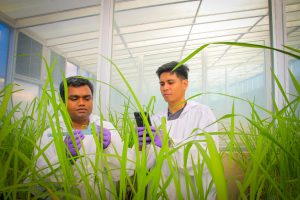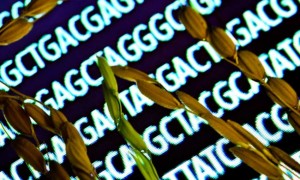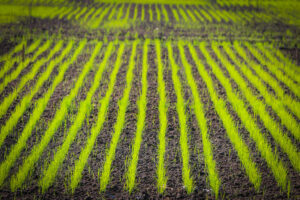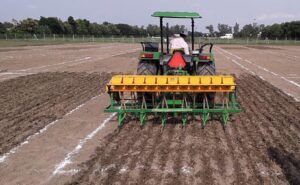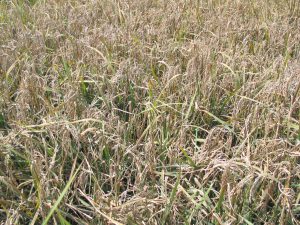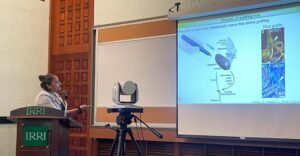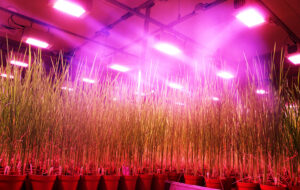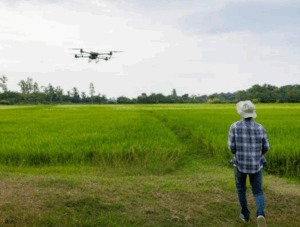
A defining moment in the history of biology was the elucidation of the laws of genetics by Gregor Mendel, whose work was rediscovered and became widely known in 1900. Ranking in the same category a century later must be the announcement of complete genome sequences, notably of humans and the plant Arabidopsis. Rice has now joined this exalted company with the announcement on 18 December 2002 of the completion of a high-quality draft sequence of the rice genome.
Rice geneticists labored for most of the 20th century to identify and map rice genes. The work hastened immensely with the advent of molecular markers in the 1990s.
However, these painstaking efforts resulted in a map location for perhaps a few hundred major genes and a similar number of genetic loci controlling quantitative traits, only a handful of which were characterized at the DNA level. Suddenly, we now possess detailed sequences of an estimated 50,000 genes that regulate the rice plant’s development.
Parallel to this stunning progress in molecular biology are similar advances in our ability to introduce genes into plants directly as DNA. The area planted to transgenic crops rose from nil in 1995 to over 50 million ha in 2001, mostly in North America. Transgenic rice is under evaluation in several countries, and we should expect commercial products to become available within a few years.
One question these trends frequently raise is, “What is the future of conventional plant breeding?” First, let me point out that “conventional plant breeding” is a misnomer. Plant breeders continually reevaluate their approaches and have adopted a wide range of tools to make their breeding efforts more efficient. For the sake of discussion, we will define conventional plant breeding as hybridization without inserting transgenes, followed by field selection.
It is true that in the early days of the biotechnology revolution one heard such comments as, “In the future, we’ll produce new plant varieties in the lab, with no need for field work.” However, even the staunchest advocates of the new biology would now dispute this misguided idea. A basic fact of applied genetic engineering is that all transgenic manipulation involves conventionally bred varieties. A transgenic plant is nothing more than a conventionally bred one with a novel gene inserted into it. While the inserted gene may add a very important feature, it remains a small part of the genetic makeup that determines the overall attributes of the plant.
We expect that the complete genome sequence of rice will greatly improve our ability to breed new rice varieties.
Our ultimate goal is to identify the function of each gene and subsequently the most favorable alleles (versions) of those genes, which we can then combine into superior rice varieties. In the future, this technology will allow us to trace all genes in our rice breeding populations. As it becomes cheaper and more widely available, it should allow us to select the best plants from the breeding populations without extensive field tests. Breeders will be able to produce elite breeding lines by directly selecting for specific combinations of alleles at the molecular level.
However, these elite lines will still require thorough evaluation by breeders, other agricultural scientists and, finally, farmers. The challenges for rice breeders are immense. We have a long way to go before solving the problem of abiotic stress tolerance, for drought in particular. In the future, rice consumers will want varieties that are not only tastier but also more nutritious. Also assuming a more important role will be such environmental concerns as durable pest resistance, more efficient nutrient uptake, and the cultivars’ response to global climate change and pollution. Genetic engineering and genomic tools will complement these rice breeding efforts. While we may not anticipate breakthroughs on a par with the yield gains of the Green Revolution semidwarfs of the 1960s, we can certainly expect incremental progress on many fronts.
One could argue that at some point we will be able to create optimum genotypes entirely in the laboratory. This is an intriguing possibility, but I expect to see demand for several more generations of scientists versed in the classical methods of plant breeding. These breeders will have a range of new tools to facilitate their work, but they should not forget how to make crosses and grow field nurseries.
_________________________________________
David J. Mackill is a plant breeder at IRRI.


